What's Happening?
Two years after the October 7 Hamas attacks, Hadassah Medical Center in Israel remains committed to treating soldiers and civilians affected by the conflict. Dr. Sheer Shabat Ben-Yehuda, a senior resident
in rehabilitation, highlighted the ongoing challenges faced by patients dealing with physical limitations, emotional distress, and chronic pain. Despite a decrease in new injuries, the center continues to support recovery efforts, helping patients return to work, military duty, or studies. The Gandel Rehabilitation Center, opened in 2024, has enhanced Hadassah's capacity to provide diverse recovery services, including dog therapy, acupuncture, yoga, and therapy sessions. Dr. Yoram Weil, director of the Orthopedic Trauma Unit, emphasized the importance of limb-saving techniques, aided by 3D printing technologies and collaboration with rehabilitation teams. The center's efforts have resulted in one of the lowest amputation rates in the country.
Why It's Important?
The ongoing rehabilitation efforts at Hadassah Medical Center underscore the long-term impact of war on individuals and healthcare systems. The center's work not only aids physical recovery but also addresses emotional and psychological challenges, highlighting the comprehensive nature of post-conflict care. The use of advanced technologies like 3D printing in medical treatments reflects the integration of innovation in healthcare, potentially setting a precedent for other institutions. The success stories of patients overcoming severe injuries and resuming normal lives serve as powerful reminders of resilience and the critical role of medical support in post-war recovery. These efforts contribute to the broader societal healing process, fostering hope and stability in a region affected by conflict.
What's Next?
Hadassah Medical Center is likely to continue expanding its rehabilitation services, potentially incorporating more advanced technologies and therapies to enhance patient outcomes. The center's collaboration with international organizations, such as the Jewish Agency, may lead to increased support and resources for ongoing recovery efforts. As patients progress in their rehabilitation, the center may focus on integrating them back into society, emphasizing vocational training and community engagement. The success of Hadassah's approach could inspire similar initiatives in other conflict-affected regions, promoting comprehensive care models that address both physical and emotional recovery.
Beyond the Headlines
The rehabilitation efforts at Hadassah Medical Center highlight ethical considerations in post-conflict healthcare, emphasizing the need for holistic approaches that address both physical and psychological trauma. The center's work raises questions about the allocation of resources in healthcare systems, particularly in regions affected by conflict. The integration of innovative technologies like 3D printing in medical treatments may influence future healthcare practices, encouraging the adoption of cutting-edge solutions to improve patient outcomes. The stories of resilience and recovery at Hadassah serve as a testament to the human spirit's ability to overcome adversity, offering hope and inspiration to communities worldwide.











